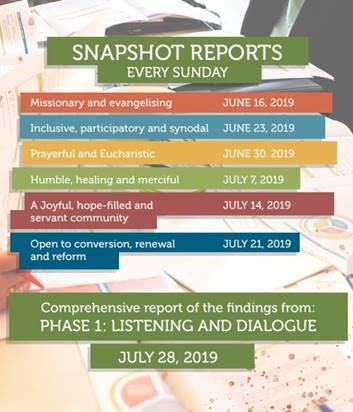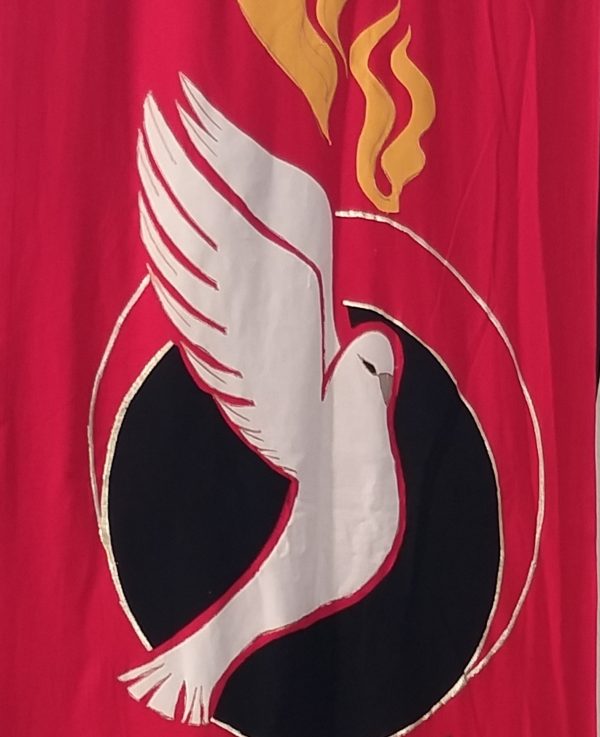Executive Officer’s Report: June 2019
The ordinariness of my June activities was overshadowed by the joyous news that the AMPJP Council has unanimously agreed to accept Sophia Education Ministries as our eleventh member.
Most of my June was spent in preparing for our end of financial year audit. I was also busy working with some of our Member Representatives in preparing for the AMPJP annual canonical stewards forum to be held in late August 2019.
Looking ahead to July, I am keen to join in NAIDOC week events and to receive the full report on the Listening and Discernment phase of the Plenary Council 2020. This will give us a more complete picture of the range and content of submissions to the Plenary Council 2020.
On Pentecost Sunday, the National Themes for Discernment for the Plenary Council 2020 were announced. Every week since then the National Centre for Pastoral Research has published a short analysis report on one of these themes.
I was struck by the first reading of the feast of Pentecost (Acts 2:1-11). It reminded me of the work of Religious Education teachers, Pastoral Care Workers and Directors of Mission within Ministerial PJPs. The scriptures says that devout people were brought together by the noise of the outpouring of the Holy Spirit. We are told that these faith seekers from foreign lands were “amazed and astonished” that they could understand the Apostles. – “we hear them preaching in our own language about the marvels of God.”
The key features of my reflection were:
-
Staff and volunteers within the ministries of Ministerial PJPs are “devout people”. They choose to work in education, health and community service because of they cherish the dignity of people and they desire to make the world a better place. They share many of our values and their goodness can be beyond that of professing Catholics.
-
The outpouring of the Holy Spirit is noticeable to others. If it isn’t noticeable maybe we are constraining the work of the Holy Spirit.
-
Good evangelisation uses the language (words, images and gestures) of the recipient. One of the benefits of non-ordained ministers is that they cannot use the sacraments of the Church and must develop language, activities and ritual which are often more attuned to those they are addressing. We have to be brave enough to speak of the marvels of God in ways that resonate with our partners in mission.
-
This is the field and the work of our Religious Education teachers, Pastoral Care Workers and Directors of Mission. They occupy this sacred space where people can come to recognise the divine at work in each other.
New events listed on the website:
-
- 24 July 2019 Ozanam Conversation. Standing Up: Reclaiming lay leadership in the Catholic sector
- 18 July 2019 Walking the the Light in Aged Care & Community Services
- 09 July 2019 Stirring the Soul – Formation of Catholic Educators and Leaders
- 02 July 2019 Redress One Year On
New website content:
The public news section of the AMPJP website now has the following posts:
- Welcoming Sophia Education Ministries (28 June 2019 – also accessible to AMPJP General and Council members)
- Celebrating Aboriginal and Torres Strait Islander Sunday (28 June 2019 – also accessible to AMPJP General and Council members)
- Pope on Climate Crisis: Time is running out, decisive action needed (17 June 2019 – also accessible to AMPJP General and Council members)
- SJOG Health Care supports UNDA Aboriginal medical students (14 June 2019 – also accessible to AMPJP General and Council members)
- Call To Help Combat Modern Day Slavery (14 June 2019 – also accessible to AMPJP General and Council members)
- Announcement of the Plenary Council 2020 Themes for Discernment (09 June 2019 – also accessible to AMPJP General and Council members)
- Bishop praises hospital’s efforts to close the gap (04 June 2019 – also accessible to AMPJP General and Council members)
The member section of the AMPJP website now has the following posts:
- AMPJP member contact details (26 June 2019 – only accessible to AMPJP General and Council members)
Image: Pentecost banner, Tighes Hill Church (artist: Dorothy Woodward rsj)
